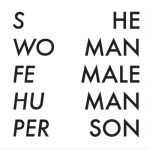Italian TV overwhelmingly consists of political chat shows – frequently dominated by the usual familiar faces hurling their opinions at one another. Political chat shows, are perfect microcosms of Italian society. They reflect Italy’s unhealthy obsession with an apocalyptic approach to politics, and they do so by suppressing the diversity of opinions. Italy’s certainly not known for its progressive opinions on gender equality, a traditionally conservative country, home to the Catholic Church’s headquarters, and unfortunately well-known for hosting Berlusconi’s sex-fuelled political scandals. As brilliant initiatives such as EU Panel Watch and the Brussels Binder are bringing awareness of the dangers of panels lacking in diversity – will this catch on in Italy?
‘Manels’ strangle conversations that should reflect society in all its complexity by prioritising the opinions of individuals that largely dominate today’s establishment.
The Berlusconi Era
So, how did we get here? Silvio Berlusconi, Italy’s 50th prime minister who was in power from 1994 until 2011 with few intermissions, was lesser known for his liberal policies, and more for popularising extremely sexist rhetoric. A close collaborator of Libya’s leader Ghaddafi, and US’s President Bush – Berlusconi is now mostly remembered for the various court trials he underwent for soliciting sex from minors. In this time, Berlusconi exacerbated a suppression of diversity in Italy’s mainstream debate. He ridiculed female voices and amplified the hyper-sexualisation of women in political debate, by consistently commenting on his female counterparts or political commentators’ appearance and sexual appeal and made lewd remarks regarding his apparently never-dwindling libido.
Women have since struggled to make their voices heard and respected. Women appeared on political chat shows predominantly as ‘veline’, dancing in lingerie at the shows’ interludes, usually mute and conventionally beautiful. A phenomenon that persists today, this firmly embedded in the minds of Italian society that women in politics had to be white, naked and most importantly: quiet.

Where are we today?
In 2013 Enrico Letta’s government made history by appointing more women MPs to his cabinet than ever before. Whilst still not a 50:50 ratio, today’s parliament remains at about 30:70 women to men in both the chamber and the senate. Yet, the proof that these statistics aren’t necessarily reflected in the respect accorded to these female voices is indeed found in their presence on Italian chat shows. Political shows across the political spectrum feature predominantly all-white, all-male panels. This is recurrent across the political spectrum. A well-known left-leaning political chat show, Propaganda Live, whilst bringing attention to very important topics in a nuanced and important way, also fails in implementing diversity in its debates.
They have female political commentators present like journalists, Francesca Schianchi and Constanze Reucher, but never allowing them a floor to develop a serious comment. In doing so, they supposedly tick the diversity box, without actually committing to including diverse opinions and experiences on their show. One particular such episode was where Reucher was asked for a fleeting comment. When she then went on to make a highly important analysis of the Global Compact on Migration, the presenter Diego Bianchi responded by deriding how long her comment was and how much she had bored the audience. This would never happen to fellow, regular journalist on the show Marco Da Milano, who has a whole segment dedicated to his opinions on the news of the week.
This is indeed a powerful insight into how female voices in Italian political debate are ridiculed, cast aside and disregarded.
However absent they may be, powerful Italian voices of women from all walks of life are plentiful. Respected mainstream political commentators such as Lilli Gruber and Lucia Annunziata are semi-regular presenters although they are never given as much of a floor as their male counterparts. Novelist and activist Michela Murgia is a prominent voice too. She has been savagely attacked online with low-ball fat-shaming insults targeted towards her powerful analyses of modern-day Italian fascism. Igiaba Scego is an Italian journalist, writer, academic and activist of Somali origin, and a crucial voice, reminding Italy of its colonial racist history that continues to be the foundation of its current political order, and dictates the cultural hegemony that stifles diversity. Others include academic Sofia Ventura who fiercely campaigns on this very topic – getting more female voices in Italian political debate.

Moreover, recently Italian politicians Laura Boldrini and Cecile Kyenge won two important cases against two Lega politicians for hate speech. Lega mayor Matteo Camiciottoli had wished for Boldrini to be raped on Facebook, and consequently has to pay a 20 000 euro fine, whilst Lega senator Roberto Calderoli has to serve 18 months for having compared Kyenge to an orangutan. The fact that these insults happened in the mainstream political sphere is shocking to all, but the fact that the women fighting against them are winning some battles remains a positive sign.
Queer voices also remain absent from Italian political debate. As it is a fiercely catholic society this has always been an extremely difficult issue to campaign on in Italy. This difficulty became overwhelmingly clear in the massive backlash to a civil partnerships bill. With the current establishment constantly attacking LGBTQ+ rights, initiatives such as Rome-based cagne sciolte and Bologna-based Arcigay should be given a larger presence.
The cultural hegemony in Italy’s chat shows plays a significant role in maintaining a society that allows the current establishment to put forward policies that deprive the fundamental human rights of marginalised peoples in Italy. Giving a dignified space to diverse voices on its talk shows would enrich an Italian debate on its society and teach empathy, compassion and kindness towards sectors of society that continue to have their dignity and rights taken away from them.
Header image: Striscia la notizia – negli studi a Milano 2 (Andy Kappa)




Average Rating